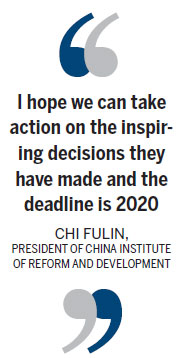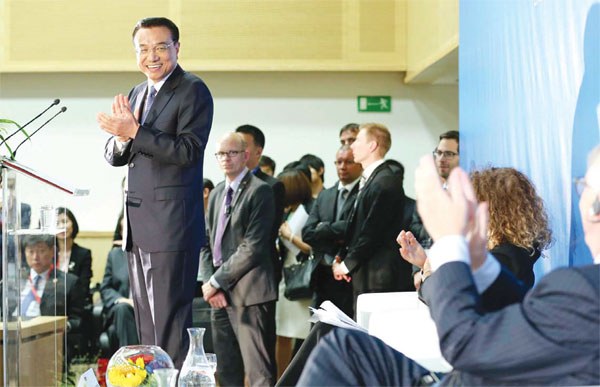After the talks, now it's time for action

China-EU summit focused on investment, connectivity and synergy; experts urge task forces
The day after Beijing and Brussels held their summit on June 29, experts from both sides urged the European Union and China to hammer out a detailed road map, assignment list and timetable to execute the decisions they reached during Premier Li Keqiang's five-day visit to Europe.
"I hope we can take action on the inspiring decisions they have made and the deadline is 2020," says Chi Fulin, president of the China Institute of Reform and Development.
| Premier Li Keqiang applauds delegates at the China-EU Business Summit in Brussels on June 29. Liu Zhen / China News Service |
"We need to form task forces immediately to identify the action plan that matches the EU-China development agenda. Obviously, the EU is high on China's foreign agenda in terms of improving its industrial levels."
Chi says it is crucial to set up such a mechanism to realize synergy between Europe's investment plan and China's Silk Road proposals. "And Premier Li has suggested setting up a joint fund, which also needs solid research and quick action."
During his visit to Belgium, the EU headquarters and France, Li indicated China's stance on the Greek crisis and announced the country's willingness to seek synergy between the European Investment Plan and China's Belt and Road Initiative.
Li made public China's goals in tackling climate change. In France, he also emphasized cooperation regarding nuclear power.
Yang Yanyi, Chinese ambassador to the EU, calls the EU-China summit "in-depth, substantive, forward-looking and action-oriented, constructive and successful", adding that Li's visit is "a symbol of showing support for a united EU, a strong euro and a prosperous Europe".
"With the China-EU relationship entering its 40th year, both sides reaffirmed their commitment to bring the China-EU comprehensive strategic partnership to its full strategic potential by vigorously exploring new dimensions of dialogue and cooperation," she says.
According to Yang, the leaders agreed to focus on the synergy between China's development agenda with the EU's strategy to co-finance and initiate projects that share mutual interest and benefits.
The synergy between the Belt and Road Initiative and the EU's investment plan is seen as a promotion of connectivity, she said. The dialogue and cooperation will be further strengthened in the digital area as well as in legal affairs in order to promote a sound environment for business cooperation between two sides, she says.
China and the EU are committed to continuing to forge their partnership, Yang says. People-to-people exchanges will be expanded, and China and the EU will deepen financial cooperation in hopes that the two sides will move toward a comprehensive China-EU free trade agreement, though that is a long-term prospect, she says.
"There is a good and solid cause for optimism for a brighter future for the China-EU relationship," says Yang.
But Chi has urged a quickening of the pace of EU-China free trade talks. "We need to take faster steps and hope we can achieve substantial progress before 2020," Chi says.
Chi says the two sides should support and initiate feasibility research for a China-EU free trade zone possible through bilateral investment negotiations and the new global economic context.
"This should be rushed to fit in the new sustainable global economy as well as the new stage that EU-China cooperation has entered," he says.

Hans-Dietmar Schweisgut, EU ambassador to China, says the summit taking place during the 40th anniversary of China-EU diplomatic relations is a good harbinger of a more intense partnership in which both sides look more forward than backward.
"This is also the year I think where the sequences of all meetings and interactions are really allowed to move forward," says Schweisgut. He says the focus of summit discussion was very much on investment, connectivity and synergy.
"There is one thing that came out of the discussion, and which I think is important, is our shared interests," he adds. "That is really the strong basis for our cooperation because only if we do have common interests can we really strive to go from cooperation to a win-win situation."
New visa centers to open
In another development, the European Union says it will set up visa centers in 15 Chinese cities that do not have embassies or consulates for EU member nations, a move expected to attract a large number of tourists from second-tier cities.
Li said on June 29 that the new visa centers would benefit more tourists, businesspeople and students studying abroad.
Zhang Yuanyuan, a former Chinese ambassador to Belgium, says: "Existing embassies and consulates cannot meet the surging demand for Chinese citizens heading for Europe. The visa centers can help fill the gap."
Embassies and consulates of EU countries in China are mainly located in first-tier cities such as Beijing, Shanghai and Guangzhou.
Several major European nations have opened consulates in a limited number of second-tier cities such as Shenyang, Wuhan and Chengdu. Still, residents of other cities have to travel far or pay travel agencies to apply for Schengen visas, which are good for most EU countries. The 15 cities have not yet been announced.
Zhang says that by diplomatic tradition, it is possible that China will set up visa centers in European cities.
"I hope Qingdao is among the 15 cities. That would save a lot of time and effort," says Fan Yonghong, a businesswoman in the coastal city in Shandong province.
Qingdao has South Korean and Japanese consulates, but no European ones. Fan went to Beijing when she applied for a Schengen visa last year.
The announcement of new visa centers came as various European countries moved this year to simplify visa policies for Chinese visitors.
Tourists heading for France, Spain and Italy can get visas in one or two days. The German embassy has expanded its visa office to provide better service, while French and Finnish embassies can send visas to applicants by express delivery.
Britain and Belgium started their united visa application service on July 1. The policy will enable Chinese tourists and businesspeople to get British and Schengen visas in just one trip to any united visa center in Beijing, Shanghai or Guangzhou.
Twenty-two Chinese tourist visits can create one job in the British tourism industry, according to a Reuters report. Chinese tourists rank first around the world in terms of overseas spending. The Financial Times has said Chinese tourists spent $498 billion abroad last year.
Chinese made about 120 million foreign visits last year, and the figure is expected to reach 200 million by 2020.
Contact the writers at fujing@chinadaily.com.cn.
(China Daily European Weekly 07/03/2015 page3)
Today's Top News
- Japan tempting fate if it interferes in the situation of Taiwan Strait
- Stable trade ties benefit China, US
- Experts advocate increasing scope of BRI to include soft power sectors
- New engine powers cargo drone expansion
- China to boost green industry cooperation
- Manufacturing PMI rises in November































